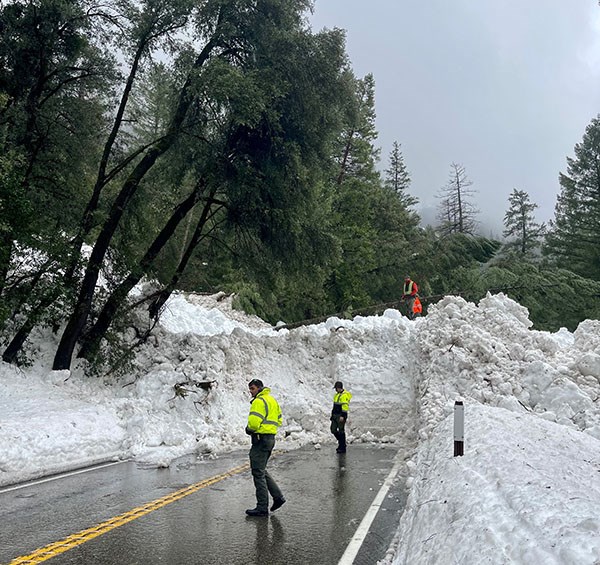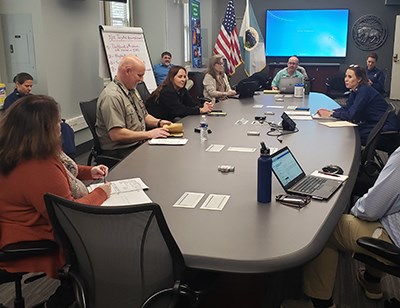Read more about the effects of 2023 storms on national parks below. Information about current severe weather is also available.
Tropical Storm Ophelia
September 25, 2023
Some park areas along the East Coast closed to prepare for Tropical Storm Ophelia, and many have or are in the process of reopening. Be sure to check individual park websites for additional information about closures, conditions, and important safety information. More information about Tropical Storm Ophelia: TROPICAL STORM OPHELIA (noaa.gov)
Hurricane Lee
September 18, 2023
Many park areas that were closed in advance of Hurricane Lee have either been reopened or are in the process of reopening. Check individual park websites for additional information about closures, conditions, and important safety information. More information about Hurricane Lee: hurricanes.gov
Northeast Region
Appalachian National Scenic Trail
Maine
Maryland
Assateague Island National Seashore
Fort McHenry National Monument and Historic Shrine
Massachusetts
National Parks of Boston
Cape Cod National Seashore
Frederick Law Olmsted National Historic Site
John Fitzgerald Kennedy National Historic Site
Longfellow House Washington's Headquarters National Historic Site
Lowell National Historical Park
Salem Maritime National Historical Park
New Jersey
Gateway National Recreation Area
New York
Gateway National Recreation Area
Sagamore Hill National Historic Site
Rhode Island
Roger Williams National Memorial
Virginia
Hurricane Idalia
September 5, 2023
National parks in the southeast region implemented preparation plans as needed to keep people safe and protect park resources due to Hurricane Idalia. Many park areas that were closed have either been reopened or are in the process of reopening. Check individual park websites for additional information about closures and conditions. More information about Hurricane Idalia: hurricanes.gov
Hurricane Hilary
August 2023
As a tropical storm, Hilary brought locally significant flash, urban, and arroyo flooding in the southwestern US on August 20, including landslides, mudslides, and debris flows. National parks in the region implemented preparation plans as needed to keep people safe and protect park resources and closed some park areas. Many have been able to reopen. However, the parks below still have closures in some or all areas. Check individual park websites for additional information about closures and conditions.
Hawai’i Wildfires
August 2023
In connection with wildfires on the Hawaiian island of Maui, Haleakalā National Park was closed to keep visitors safe and reduce demand on Maui’s emergency services, but has been reopening park areas. Please visit the park's website for details about operations and conditions.
In addition, as part of a robust whole-of-government response effort to support immediate and long-term rescue and recovery efforts in Maui, DOI personnel have been supporting efforts through a number of strategies.

NPS photo
California Winter Storms
February – March 2023
Due to impacts from winter storms, a number of national parks in California implemented severe weather plans and closed some or all areas to protect visitors and employees. Parks reopened closed areas as conditions allowed.
Please check park websites for details.
Coordinating the NPS Response to Severe Weather Events and Natural Disasters

NPS photo
The immediate NPS response for parks significantly impacted by severe weather and other natural disasters is often coordinated by an NPS incident management team (IMT). An IMT’s work focuses on accounting for and assisting employees at impacted parks, organizing for the recovery work ahead, and bringing in additional staff resources to conduct damage assessments, coordinate debris removal, and provide access to park areas. The NPS also coordinates closely with the Federal Emergency Management Agency (FEMA), the lead agency for the federal response to natural disasters and severe weather emergencies.
As the NPS responds to these extreme events, employees remain vigilant and adhere to recommendations and guidelines to reduce the spread of highly infectious diseases. All responders follow recommendations provided by the Centers for Disease Control and Prevention (CDC) to stay healthy and reduce the spread of illness. As needed, the NPS Office of Public Health and Office of Risk Management provide guidance, information, and support to help mitigate risk of disease transmission.
Check the list of park alerts for additional information about park closures and warnings. You can also read more about 2022, 2021, 2020, 2019, 2018, and 2017 incidents that affected national parks.
NPS Policy and Authorities
NPS emergency response efforts are directed by NPS Management Policies, which state, “The saving of human life will take precedence over all other management actions as the National Park Service strives to protect human life and provide for injury-free visits” (Section 8.2.5.1, Visitor Safety and Emergency Response). The NPS ability to respond to incidents is essential to the safety of all who enter NPS areas and is implemented in this policy.
The NPS also has authority to support emergency response outside of the parks. During times of emergency, the NPS may be asked to provide response to conduct search and rescue, firefighting, or public safety and security. The NPS can provide support for needs involving public works and engineering, public health and medical services, oil and hazardous spill response, and external affairs. In addition, the NPS is one of the support agencies to provide natural and cultural resources and historic preservation functions in the federal government under the National Response Framework.
Other Federal Resources and Information from FEMA and the CDC
- The Federal Emergency Management Agency (Department of Homeland Security) (Español) is the lead agency for the federal response to emergencies.
- USA.gov provides links to the latest available information on relief and response, including preparedness, helping survivors, and other resources. (GobiernoUSA.gov también provee información del gobierno en español.)
- The Centers for Disease Control and Prevention has information about natural disasters, severe weather, and COVID-19 including guidelines for preparing for hurricanes.
- For information about tropical weather that may be affecting a park near you, please visit the National Hurricane Center of the National Oceanic and Atmospheric Administration. The NHC issues watches, warnings, forecasts, and analyses of tropical weather.
Last updated: January 19, 2024
